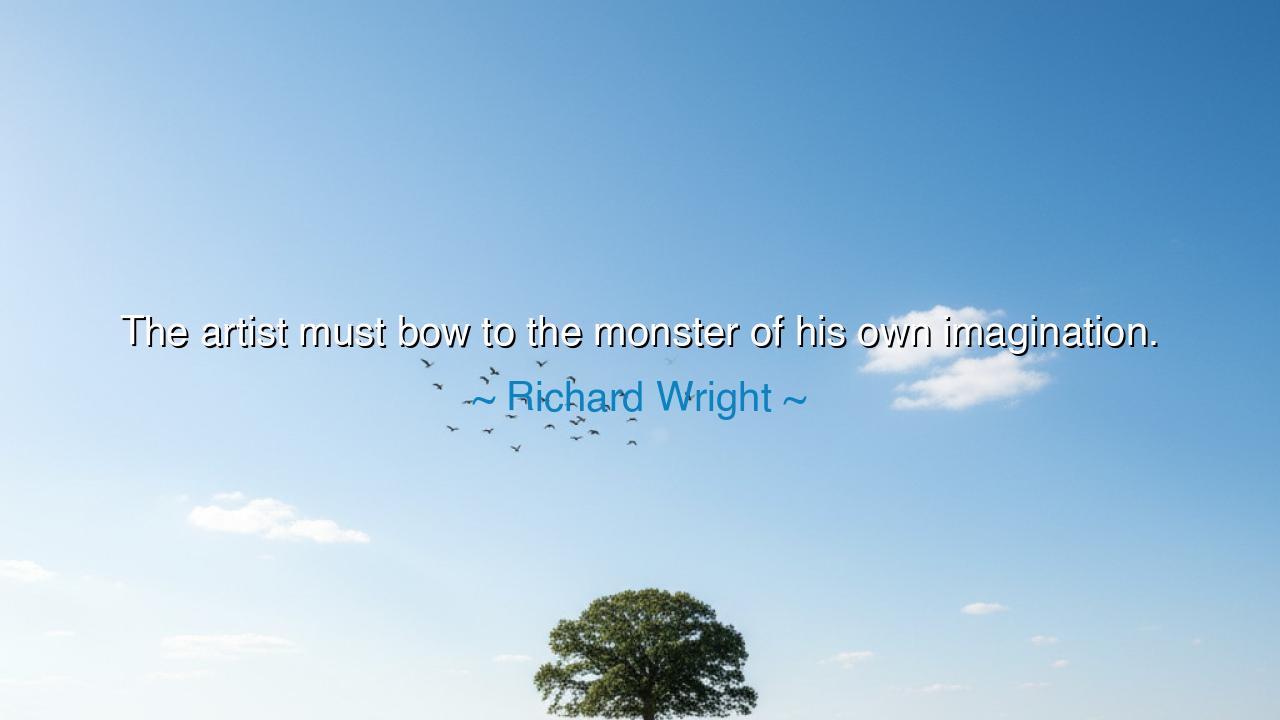
The artist must bow to the monster of his own imagination.






"The artist must bow to the monster of his own imagination." Thus spoke Richard Wright, the voice of fire and truth, whose words still burn in the hearts of all who create. In this single line, he captures the fierce and sacred struggle between the artist and his imagination—that mighty, untamed force that both inspires and torments. Wright, who wrote of the pain and glory of the human condition, knew well that true art does not come from comfort, but from surrender—from bowing before the vast and uncontrollable spirit that lives within the creative soul. For imagination is not gentle; it is a monster—wild, demanding, and insatiable—and only those brave enough to face it without fear can give birth to great works.
In the origin of these words lies the story of Wright’s own life, a journey marked by exile, struggle, and vision. Born into the darkness of poverty and racial injustice, he carried within him an imagination that refused to be silenced. Yet that imagination did not bring him peace—it brought him restlessness. It haunted him with images of oppression, of violence, of yearning souls trapped in invisible chains. His works, from Native Son to Black Boy, were not creations of serenity but of confrontation. He bowed to his monster, and in doing so, he released it into the world—not tamed, not beautified, but raw and true. It was this surrender to his imagination’s power that made him one of the most fearless voices of his time.
To understand Wright’s wisdom is to understand the paradox of creation itself. The imagination is both gift and burden, muse and tyrant. It fills the artist’s mind with visions too vast for words, emotions too deep for reason. The weak turn away from it, afraid of what they might see; the strong yield, knowing that to create, one must first be devoured. The artist does not command his imagination—he serves it. He follows it into the depths, where beauty and terror dwell side by side, and brings back the truths that others cannot bear to face. To bow is not to submit in weakness, but to recognize that genius begins in humility before the unknown.
This truth has echoed through every age. Consider Vincent van Gogh, the painter of stars and sorrow. His imagination was his tormentor and his god, filling his mind with colors that no one else could see, emotions that tore his soul apart. He painted with a kind of divine fever, as though possessed by his own visions. The world called him mad, but he was not mad—he was obedient. He bowed to the monster of his imagination, and though it consumed his peace, it gave him immortality. Each brushstroke was an act of reverence and sacrifice. His art, like Wright’s, was born from struggle, not serenity—from his refusal to silence the wild voice within.
Wright’s quote also speaks to a deeper moral truth: that creation requires surrender. In an age obsessed with control—where people wish to master every outcome and tame every force—the artist stands apart. He knows that real creation cannot be managed or measured. The imagination is not a servant to logic or expectation; it obeys no rules but its own. The artist’s task, therefore, is not to shape his imagination to fit the world, but to let it shape him—to become its vessel. To create true art, one must risk being undone by it, for only through such surrender can the artist touch the divine.
And yet, there is both terror and beauty in this surrender. The monster Wright speaks of is not evil—it is the wild power of life itself, the unfiltered truth of existence. When an artist bows to it, he joins the ranks of those who have dared to channel something larger than themselves: Homer singing the wrath of Achilles, Michelangelo carving the human form from stone, Toni Morrison giving voice to the ghosts of history. Each, in their own way, yielded to a force beyond comprehension. They did not create art—they became it.
So, my children of creation and wonder, remember this teaching: to imagine is to summon the divine, but to create is to bow before it. Do not fear the monster that dwells in your imagination. It is not your enemy, but your destiny. It will frighten you with visions too vast to contain, demand of you sacrifices you never thought you could give. But if you bow—if you surrender your pride and trust its voice—you will give the world something eternal.
For in the end, Wright’s wisdom is a call to courage: to face the storm within and let it speak through you. The artist who resists his imagination becomes hollow; the one who serves it becomes immortal. Bow, then, not in fear, but in reverence. Bow to the monster of your imagination, and let it make of you what it will—for through its wildness, you shall find the truth, and through that truth, you shall set others free.






AAdministratorAdministrator
Welcome, honored guests. Please leave a comment, we will respond soon